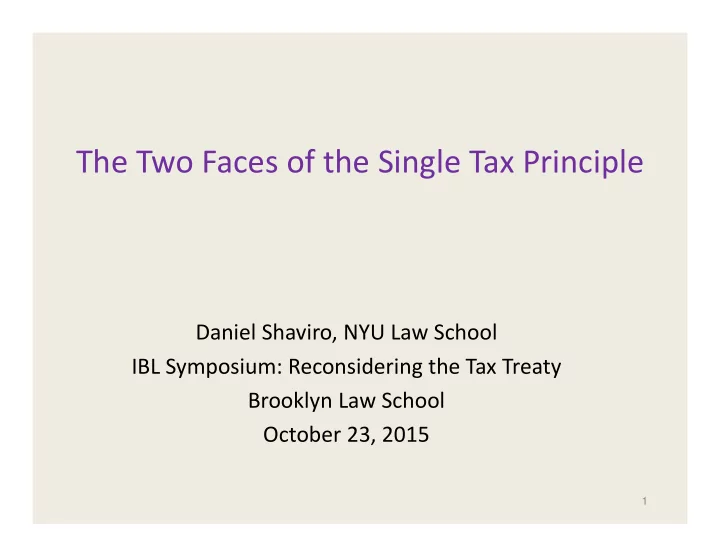

The Two Faces of the Single Tax Principle Daniel Shaviro, NYU Law School IBL Symposium: Reconsidering the Tax Treaty Brooklyn Law School October 23, 2015 1
A single tax principle? Treaties arguably say “tax everything once” if we broaden the “fiscal evasion” concept. Terminology: double taxation departs from this principle on the “upside;” double non ‐ taxation and stateless income depart on the downside. But the two “faces” raise distinct issues, not all that usefully amalgamated. Upside departures are a bit of a red herring – treaties that ban it (if they do!) may impede good solutions. Downside departures may be problematic, but raise more complicated issues – & hard to address effectively through bilateral tax treaties. 2
Upside departures # of times taxed is formalistic! What matters is tax burdens imposed. E.g., I’d rather be taxed 20X @ 1% each time than once @ 35%. Say U.S. has 35% rate, Germany 20%, Acme ‐ US earns $100 pre ‐ tax in Germany. Classical WW/FTC (worldwide/foreign tax credit) system: Acme ‐ US pays $15 U.S. tax. Suppose instead that the U.S. only allows foreign tax deductions, but taxes FSI (foreign source income) @ 15%. Acme now double ‐ taxed, but pays only $12! So it’s a victimless “crime.” 3
Why this matters Two distinct margins: domestic tax burden on FSI, MRR (marginal reimbursement rate) for foreign taxes. WW/FTC and territoriality are compound systems – for no good reason, once one rejects the upside of the single tax principle. WW/FTC: MTR (marginal tax rate0 for FSI = domestic rate (too high), ATR (average tax rate) depends on domestic vs. foreign tax rates (anomalous), MRR = 100% absent deferral (too high). Deferral lowers ATR & MRR, but guarantees a bad ratio of DWL (deadweight loss) to revenue. Territoriality: MTR & ATR for FSI = 0% (too low), MRR = MTR (implicit deductibility) which is either just right or too low (note universality of CFC rules addressing stateless or tax haven income). 4
A better way? Baucus Staff Discussion Draft, Option Z, shows how broadening the options might be treaty ‐ compatible. Say each dollar of FSI is 60% taxable with FTCs, 40% exempt. Then, with a 35% tax rate for domestic source income, MTR = 21%, MRR = 60%. While no reason to think this is perfect, probably better than what we have today (if also no deferral, raise or lower the 60% ratio as one likes). I’d argue that this is (or should be) treaty ‐ compatible – no double taxation in form if one allows bifurcation. More importantly, in substance it addresses over ‐ burdening FSI to the same degree as requiring that the ratio be 0% or 100%! 5
An unwise retreat?? (Or not) Do we need a simple and powerful norm (such as anti ‐ double taxation) to discourage over ‐ burdening FSI? Maybe “Yes” if countries were strongly inclined to over ‐ burden FSI – but there is little evidence of this. The widespread shift towards territoriality, rationalized on national self ‐ interest grounds, sheds light on this question. What’s more, allowing bifurcation really does not weaken any such protection as the anti ‐ double tax norm provides. Requiring that the MRR be ≥ FSI tax rate / domestic tax rate directly addresses over ‐ burdening. 6
Downside departures Being taxed zero times – unlike being “taxed twice” – actually does tell us something about the burden imposed. 0 times any finite number = 0! But need further analysis to see why & when this might be objectionable. The people in a given country don’t directly benefit from paying taxes to another country – so the downside isn’t directly / unilaterally / unconditionally objectionable. Reasons for objecting to double/global non ‐ taxation: (a) tag for domestic base ‐ stripping?, (b) reciprocity / cooperation. 7
Addressing downside departures Treaties aren’t a promising mechanism, since they’re bilateral & responses may need to be multilateral. OECD ‐ BEPS (obviously) addresses that, though how successfully remains to be seen. Arranging multilateral cooperation is difficult! Anti ‐ OECD ‐ BEPS political winds already swirling in the U.S. (not a surprise). Even with widespread adoption, the retention of separate entity accounting, transfer pricing, etc., might invite pessimism. 8
Recommend
More recommend